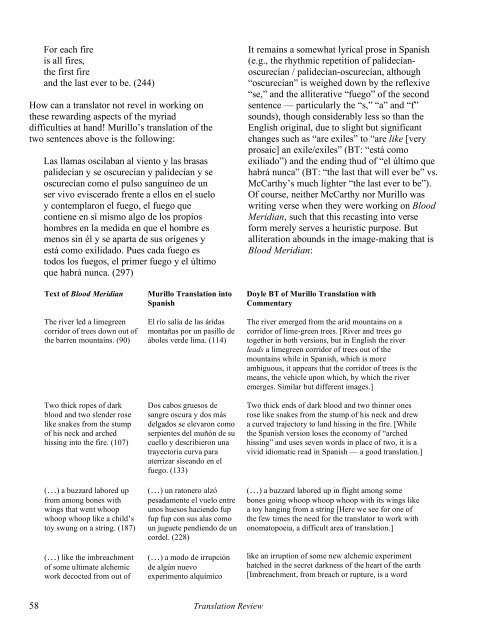Translation Review - The University of Texas at Dallas
Translation Review - The University of Texas at Dallas
Translation Review - The University of Texas at Dallas
You also want an ePaper? Increase the reach of your titles
YUMPU automatically turns print PDFs into web optimized ePapers that Google loves.
For each fire<br />
is all fires,<br />
the first fire<br />
and the last ever to be. (244)<br />
How can a transl<strong>at</strong>or not revel in working on<br />
these rewarding aspects <strong>of</strong> the myriad<br />
difficulties <strong>at</strong> hand! Murillo’s transl<strong>at</strong>ion <strong>of</strong> the<br />
two sentences above is the following:<br />
Las llamas oscilaban al viento y las brasas<br />
palidecían y se oscurecían y palidecían y se<br />
oscurecían como el pulso sanguíneo de un<br />
ser vivo eviscerado frente a ellos en el suelo<br />
y contemplaron el fuego, el fuego que<br />
contiene en sí mismo algo de los propios<br />
hombres en la medida en que el hombre es<br />
menos sin él y se aparta de sus orígenes y<br />
está como exilidado. Pues cada fuego es<br />
todos los fuegos, el primer fuego y el último<br />
que habrá nunca. (297)<br />
It remains a somewh<strong>at</strong> lyrical prose in Spanish<br />
(e.g., the rhythmic repetition <strong>of</strong> palidecíanoscurecían<br />
/ palidecían-oscurecían, although<br />
“oscurecían” is weighed down by the reflexive<br />
“se,” and the alliter<strong>at</strong>ive “fuego” <strong>of</strong> the second<br />
sentence — particularly the “s,” “a” and “f”<br />
sounds), though considerably less so than the<br />
English original, due to slight but significant<br />
changes such as “are exiles” to “are like [very<br />
prosaic] an exile/exiles” (BT: “está como<br />
exiliado”) and the ending thud <strong>of</strong> “el último que<br />
habrá nunca” (BT: “the last th<strong>at</strong> will ever be” vs.<br />
McCarthy’s much lighter “the last ever to be”).<br />
Of course, neither McCarthy nor Murillo was<br />
writing verse when they were working on Blood<br />
Meridian, such th<strong>at</strong> this recasting into verse<br />
form merely serves a heuristic purpose. But<br />
alliter<strong>at</strong>ion abounds in the image-making th<strong>at</strong> is<br />
Blood Meridian:<br />
Text <strong>of</strong> Blood Meridian<br />
<strong>The</strong> river led a limegreen<br />
corridor <strong>of</strong> trees down out <strong>of</strong><br />
the barren mountains. (90)<br />
Two thick ropes <strong>of</strong> dark<br />
blood and two slender rose<br />
like snakes from the stump<br />
<strong>of</strong> his neck and arched<br />
hissing into the fire. (107)<br />
(…) a buzzard labored up<br />
from among bones with<br />
wings th<strong>at</strong> went whoop<br />
whoop whoop like a child’s<br />
toy swung on a string. (187)<br />
(…) like the imbreachment<br />
<strong>of</strong> some ultim<strong>at</strong>e alchemic<br />
work decocted from out <strong>of</strong><br />
Murillo <strong>Transl<strong>at</strong>ion</strong> into<br />
Spanish<br />
El río salía de las áridas<br />
montañas por un pasillo de<br />
áboles verde lima. (114)<br />
Dos cabos gruesos de<br />
sangre oscura y dos más<br />
delgados se elevaron como<br />
serpientes del muñón de su<br />
cuello y describieron una<br />
trayectoria curva para<br />
<strong>at</strong>errizar siseando en el<br />
fuego. (133)<br />
(…) un r<strong>at</strong>onero alzó<br />
pesadamente el vuelo entre<br />
unos huesos haciendo fup<br />
fup fup con sus alas como<br />
un juguete pendiendo de un<br />
cordel. (228)<br />
(…) a modo de irrupción<br />
de algún nuevo<br />
experimento alquímico<br />
Doyle BT <strong>of</strong> Murillo <strong>Transl<strong>at</strong>ion</strong> with<br />
Commentary<br />
<strong>The</strong> river emerged from the arid mountains on a<br />
corridor <strong>of</strong> lime-green trees. [River and trees go<br />
together in both versions, but in English the river<br />
leads a limegreen corridor <strong>of</strong> trees out <strong>of</strong> the<br />
mountains while in Spanish, which is more<br />
ambiguous, it appears th<strong>at</strong> the corridor <strong>of</strong> trees is the<br />
means, the vehicle upon which, by which the river<br />
emerges. Similar but different images.]<br />
Two thick ends <strong>of</strong> dark blood and two thinner ones<br />
rose like snakes from the stump <strong>of</strong> his neck and drew<br />
a curved trajectory to land hissing in the fire. [While<br />
the Spanish version loses the economy <strong>of</strong> “arched<br />
hissing” and uses seven words in place <strong>of</strong> two, it is a<br />
vivid idiom<strong>at</strong>ic read in Spanish — a good transl<strong>at</strong>ion.]<br />
(…) a buzzard labored up in flight among some<br />
bones going whoop whoop whoop with its wings like<br />
a toy hanging from a string [Here we see for one <strong>of</strong><br />
the few times the need for the transl<strong>at</strong>or to work with<br />
onom<strong>at</strong>opoeia, a difficult area <strong>of</strong> transl<strong>at</strong>ion.]<br />
like an irruption <strong>of</strong> some new alchemic experiment<br />
h<strong>at</strong>ched in the secret darkness <strong>of</strong> the heart <strong>of</strong> the earth<br />
[Imbreachment, from breach or rupture, is a word<br />
58 <strong>Transl<strong>at</strong>ion</strong> <strong>Review</strong>

















